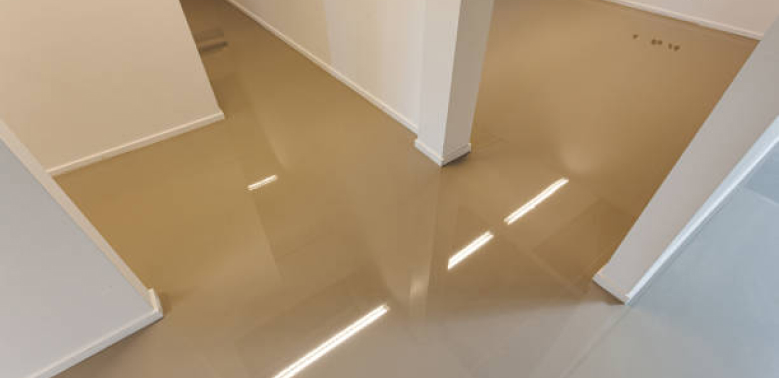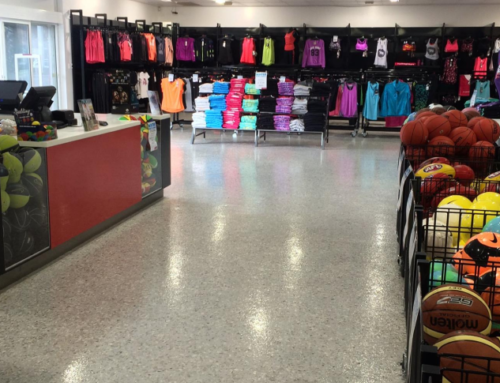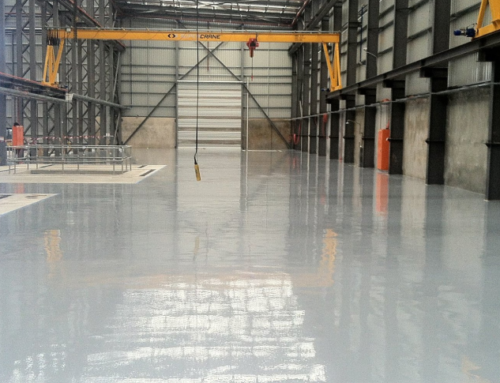It’s durable, decorative, affordable, low-maintenance, anti-microbial, slip-resistant – the list goes on, but we know you’re busy. So, instead of listing the (many) advantages of an epoxy floor, we’ll break down the most popular types for you to choose from.
The truth is, not all epoxy flooring is created equal. There are different variations to choose from based on your budget, your needs, and your aesthetic interests.
To help you step foot on a floor you love, but more importantly, that can handle everything you throw at it, here’s everything you need to know about the types of epoxy flooring, and which one will be best for you.
What are the most important characteristics of epoxy flooring?
First thing’s first: what are the most important characteristics of epoxy flooring?
The first step is to differentiate between epoxy flooring, epoxy floor coating, and epoxy paint.
Let’s start with epoxy paint which is a latex acrylic product that only has a small amount of epoxy mixed in. It’s significantly more durable than standard paint, and it is unlikely to chip or flake off over time. That said, it is not nearly as durable as true epoxy flooring.
True epoxy flooring is made from a mix of epoxy resin and hardener. When these ingredients are mixed, they create an ultra-hard floor coating that’s usually at least 2 millimetres thick (if it’s less than 2 millimetres thick, it’s generally classified as an epoxy floor coating).
This resulting epoxy flooring is known for being:
- Chemical resistant even against harsh industrial and pharmaceutical chemicals
- Shock-resistant which makes it appropriate for warehouses and factories
- Slip-resistant which can be ideal for hospital settings, pools, or chemical labs
- Long-lasting so you will have a floor coating that will last for decades to come
- Cost-effective as you can apply epoxy on top of existing flooring without having to rip it up – even if it is damaged
- Safe as once the epoxy flooring is properly cured, there are no harsh chemicals or safety concerns
- Anti-microbial thanks to its smooth, non-porous, easy-to-clean surface
This makes it ideal for many commercial, industrial, and residential applications, including manufacturing facilities, warehouses, showrooms, commercial garages, gyms and other athletic facilities, locker rooms, and cafeterias.
What are the different types of epoxy flooring?
With all those benefits in mind, there are many different types of epoxy floorings that you can choose between. Here’s a simple breakdown of your options.
#1 – Metallic Epoxy
Metallic epoxy flooring finish is created by spreading metallic pigments using a roller or a brush. It ultimately provides a decorative, aesthetically pleasing final look that can add a touch of personality and shine without compromising solid epoxy’s durability. You can find metallic epoxy coatings in a variety of colours, including:
- Gold
- Ruby
- Copper
- Silver
#2 – Self-Dispersing Epoxy
Self-dispersing, or self-levelling epoxy flooring can be applied over new or old, cracked, and damaged concrete. It creates an ultra-smooth surface that can hide cracks and imperfections in your existing floor. It can also be mixed with quartz sand for added durability. It’s generally used in high-traffic areas or areas with heavy machinery thanks to its extra durability and smoothness.
#3 – Electrostatic Dissipating (ESD) Epoxy
ESD epoxy flooring is specially formulated to prevent static and electric charge build-up in the environment. This is particularly suitable for places where ESD is a real threat or hazard, including:
- Labs
- Hospitals
- Chemical manufacturing facilities
- Electronic manufacturing facilities
#4 – Flake Epoxy
Flake flooring is created when colourful acrylic chips are added to epoxy resin to create a beautiful, speckled final product. There are many colour options that can be used, and the final product has additional grip that makes it much more slip-resistant. This type of epoxy flooring is ideal for places like:
- Pools
- Locker rooms
- Sports venues
- Showrooms
#5 – Quartz-Filled Epoxy
You can also add quartz mineral to epoxy flooring for an extra durable, beautiful finish. Like flake flooring, quartz epoxy creates an anti-slip surface that’s ideal for places where an accident could happen.
How to find a reliable epoxy flooring service provider
When choosing an epoxy floor provider, there are a few questions that you can ask yourself to help with the decision-making. Specifically, you should ask questions about…
The type of epoxy floor you’re looking for: Now that you know the most popular epoxy options – and their benefits – you can decide on the type that would be best for you.
The colour and design you’re looking for: There are a lot of colour and design options, even within each specific type of epoxy flooring. It’s important, then, to become clear about what customizations you want – and make sure that the service provider you’re looking at has those options available.
Whether your space is appropriate for epoxy: Certain spaces are ideal for certain types of flooring. It’s important to know which one will best suit your needs.
What benefits you’re looking for: Are you looking for soundproofing? Extra durability? Non-slip properties? Colour? Design? Make sure you’re clear about the specific benefits and features that you’re looking for.
What your budget can achieve: Certain types of epoxy flooring, like ESD, are more expensive. It’s important, then, that you understand your budget and the total costs so that you can make an informed decision.
How much time you have for installation: The epoxy installation process isn’t slow – and you should be sure that the service provider that you choose can complete the job within your time frame.
Signs of a professional epoxy flooring installer
Once you answer all of those questions, it’s time to choose the best epoxy professional for you. You want to make sure that your installer is:
✓ Fully licensed and insured
✓ Reputable, with ability to give you references
✓ Experienced working in your space (commercial, industrial, or residential)
✓ Able to provide all the equipment needed to complete the job effectively
✓ Able to offer the right warranties
✓ Able to provide you with a free consultation
Need help with your next epoxy project?
Installing epoxy flooring may seem straightforward, but it’s a complex process – and it’s easy to get wrong. It’s important, then, that – once you choose the type of epoxy flooring that you want – you choose a quality installer that can get the job done effectively.
At Hawk CFC, we understand that every project is unique, and we are committed to creating and installing the perfect epoxy flooring for you and your space. If you have any questions about the process, about our experience in your industry, or about the types of epoxy flooring that are available to you, feel free to fill out a form or call us on 0490 777 761 to learn more about our process.







